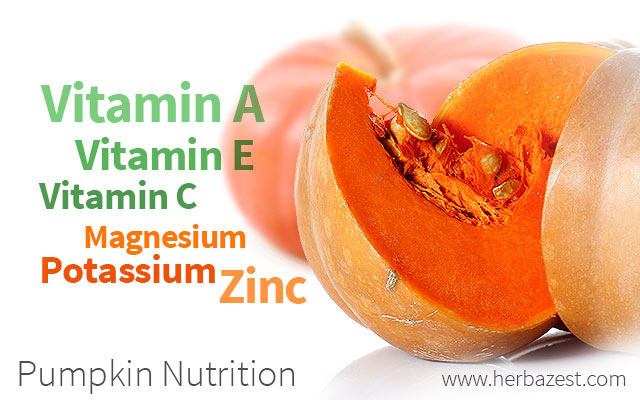While it is oftentimes just perceived as seasonal decoration, the pumpkin fruit and its related parts provide a surprisingly wide range of essential vitamins and minerals - like vitamin A, vitamin E, zinc, and magnesium - which are important for maintaining overall health and well-being. Read on to discover the key nutrients in pumpkin!
Essential Nutrients in Pumpkin
Vitamin A
Plant beta-carotenes play a key role in pumpkin nutrition since they are necessary for the production of vitamin A. Besides dairy products and fish oils, brightly-colored orange and yellow fruits and vegetables are among the best sources of vitamin A. Pumpkin is chock-full of this fat-soluble compound, which helps maintain healthy vision and skin. Vitamin A is also needed for cellular growth and bone health.
Vitamin E
Found primarily in vegetable oils, nuts, and dark green leafy vegetables, vitamin E is also present in high amounts in pumpkins. This powerful antioxidant works to thwart the harmful effects of free radicals found in the body. It not only supports the immune system so that the body can protect itself from foreign bacteria and illnesses, but also widens blood vessels to prevent clots.
Vitamin C
Pumpkins are also a source of vitamin C, which helps maintain healthy skin. Moreover, vitamin C is vital in the production of collagen, which is necessary for wound healing. A vitamin C deficiency is known to cause scurvy, which is associated with the loss of hair and teeth; sore, swollen gums; and fatigue.
Magnesium
Pumpkins also contain magnesium, a mineral responsible for the production of energy, protein synthesis, and blood pressure regulation. A lack of magnesium in the diet may cause nausea, vomiting, and fatigue in mild cases and muscle spasms and seizures in more severe cases. As an added benefit, pumpkins are a good source of protein, which is also used to create energy and to help the body build and repair tissues.
Potassium
To build protein and muscle, the body uses a mineral called potassium, which can be found in pumpkins. A diet that is low in sodium and high in potassium may lower high blood pressure levels over time. Though the amount of potassium in pumpkins is only about 230 mg per 100-gram serving, it works together with other minerals to produce a hypotensive effect.1
Zinc
Finally, zinc is a vital mineral responsible for acting as a catalyst for nearly 100 different enzymes. Pumpkin's nutritional content of zinc plays a crucial role in wound healing and protein synthesis, while supporting healthy growth and development, especially during the formative years of pregnancy and early childhood.
Pumpkin's Supporting Compounds
In addition to the aforementioned nutritional content of pumpkin, this fruit boasts phyto-constituents that exert anti-diabetic, antioxidant, and anti-inflammatory properties. Flavonoids, for example, are compounds whose consumption may help prevent certain cardiovascular diseases. Oleic acids are healing, anti-inflammatory compounds that are thought to be beneficial for inflammatory diseases, like prostate enlargement. Linoleic acids, on the other hand, may help the body maintain a healthy weight.
Pumpkin Nutritional Facts
Here are other nutritional facts about pumpkin that may help further illuminate the benefits of this popular fruit:1,2,3
- A mere 100-gram serving of cooked pumpkin provides about 36% of the daily recommended intake of vitamin A.
- Low in calories and made up of about 90% water, pumpkin can be used to fight dehydration.
- Pumpkin leaves are edible and may be prepared like other dark green, leafy vegetables. They provide almost as much iron as spinach and nearly three times as much as kale.
- Pumpkin seeds contain high levels of vitamin E, an important nutrient that may help to lower blood pressure by widening blood vessels and preventing clots.
- A pumpkin's pulp contains more than twice as much vitamin C as its seeds.
- A one-ounce serving of pumpkin seeds yields about 19% of the recommended daily intake of protein, which builds muscles.
Numerous research studies on pumpkin have shed light on the benefits of its nutritional content. Pumpkins are wholesome foods full of essential vitamins and minerals that are beneficial for the overall health of the human body. To this end, pumpkins may be a wise addition to any healthy, well-balanced diet.
Sources
- European Food Research & Technology, Variability of vitamin E content in pumpkin seeds (Cucurbita pepo L), 1996
- International Journal of Food Science and Technology, Vitamins composition of pulp, seed and rind of fresh and dry Rambutan Nephelium Lappaceum and squash Cucurbita pepo’L, 2013
- National Institutes of Health, Zinc | Magnesium | Vitamin E | Vitamin C | Vitamin A
- Nutrition Research Reviews, Medicinal and biological potential of pumpkin: an updated review, 2010
- USDA Nutrient Database
- Power Foods, pp. 25, 57, 358, 371
Footnotes:
- US Department of Agriculture. (2019). Pumpkin, cooked, boiled, drained, without salt. Retrieved October 18, 2021 from https://fdc.nal.usda.gov/fdc-app.html#/food-details/168449/nutrients
- US Department of Agriculture. (2019). Seeds, pumpkin and squash seeds, whole, roasted, without salt. Retrieved October 18, 2021 from https://fdc.nal.usda.gov/fdc-app.html#/food-details/170188/nutrients
- University of Illinois Extension. (n.d.). Pumpkin Facts. Retrieved October 18, 2021 from https://web.extension.illinois.edu/pumpkins/facts.cfm




